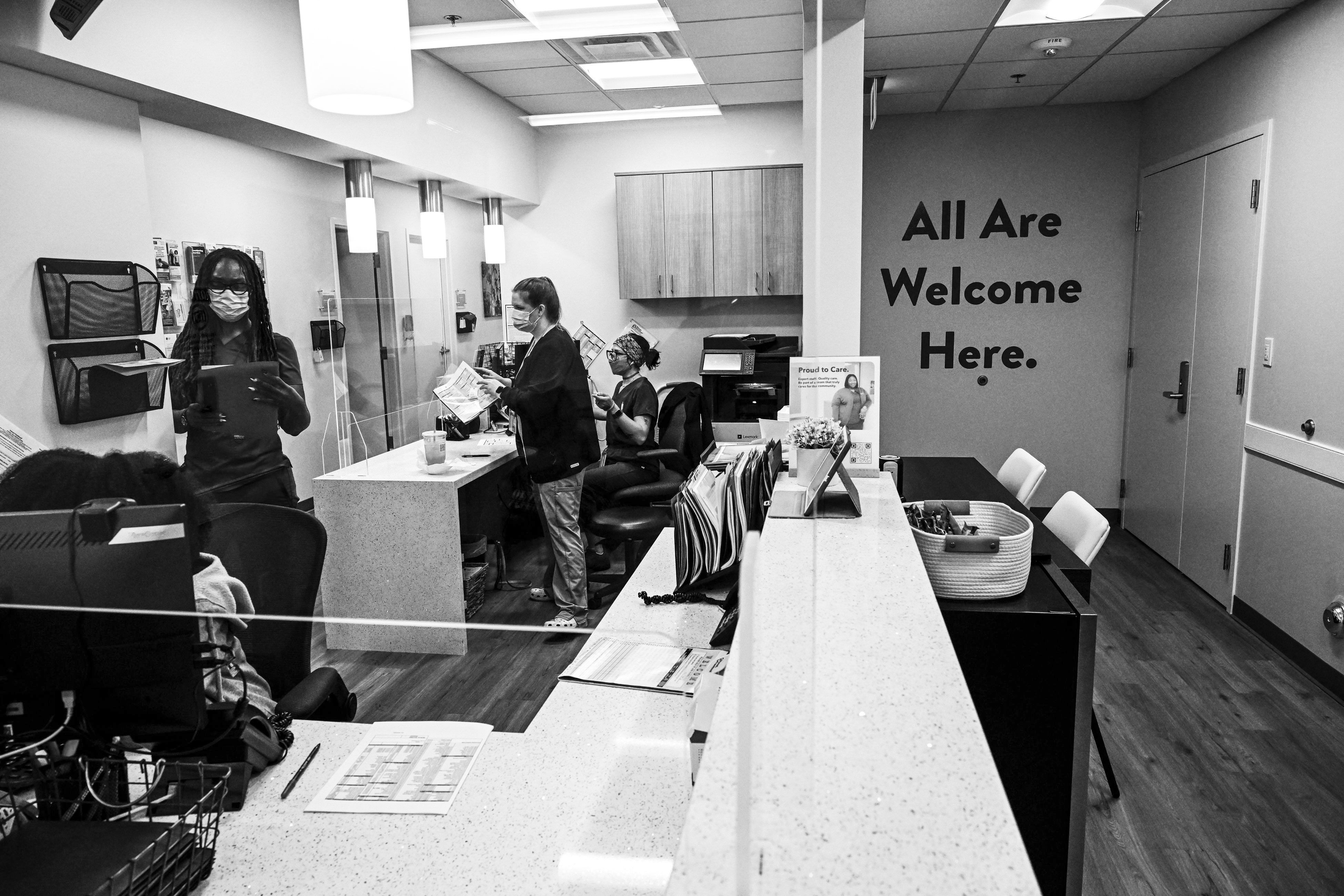[ad_1]

The team at the independent abortion clinic A Woman’s Choice has been overwhelmed with patients at its North Carolina and Florida locations since the overturn of Roe v. Wade. People from all over the South travel hundreds of miles to get care at the clinics, with staff doing the best they can to meet the crushing need. Hoping to alleviate some of the strain, the team decided to open a fifth location in Danville, Virginia, which borders North Carolina, last month. “We opened the clinic in Virginia because of the 12-week ban in North Carolina but then also in anticipation of the six-week ban in Florida,” says Amber Gavin, the organization’s vice-president of advocacy and operations. “We knew that there was really nowhere in the Southeast that folks were going to be able to access care after 12 weeks.”
The move was prescient: As has happened so frequently in the nearly two years since Dobbs, the ax suddenly came down in the Sunshine State last week. The Florida Supreme Court ruled that the state’s constitution does not protect abortion rights, overturning decades of precedent and allowing the six-week ban to go into effect on May 1 (patients can get an abortion up to 15 weeks of pregnancy until that date).
The situation is “catastrophic and devastating for all of the South,” Gavin says. In 2023, there were around 84,000 abortions performed in the Sunshine State, making up about 1 in 12 abortions in the U.S. Florida has seen one of the most dramatic increases in abortion seekers from out of state since Dobbs, which Gavin says the A Woman’s Choice clinic in Jacksonville has experienced firsthand, with nearly half of its patients coming from other states.
Those people will now face even more challenges when accessing abortion care. The six-week ban — which outlaws abortion two weeks after a missed period — is in effect a total ban, Gavin says. Most people don’t know they are pregnant at that stage. Additionally, Florida has a mandatory 24-hour waiting period that requires abortion seekers to visit a clinic in-person twice, a requirement that already represented a significant burden for patients and now will make getting an abortion nearly impossible. Gavin says she’s specifically concerned about minors who require a judicial bypass to get care, as that process can take days. “Overall, I think some folks may self-manage while a lot of folks are gonna fall through the cracks, and they’re gonna be forced to remain pregnant against their will,” she says. “That’s really cruel and immoral.”
A Woman’s Choice is now adding more days to its appointment schedule and actively recruiting more staff for the Virginia location. The organization is also part of Floridians Protecting Freedom, the umbrella group behind Amendment 4, the ballot measure that would codify abortion rights in the state’s constitution. It’s using the bulk of its advocacy resources to campaign for the amendment and educate voters on how the measure offers a path to restore access in the state.
Planned Parenthood of South, East, and North Florida, Inc., has been training more staff at its eight clinics to perform ultrasounds so that they can see as many patients as possible and help date pregnancies more efficiently, according to Michelle Quesada, vice-president of communications and marketing at the organization. (A separate affiliate, Planned Parenthood of Southwest and Central Florida, has its own nine health centers.) Quesada says her affiliate’s clinics are also extending their appointment times in preparation for the six-week ban, coordinating with health centers in other states, and educating every patient coming through their doors about the new law — regardless of whether they’re there for an abortion.
“We still get patients who don’t even know there’s a 15-week ban right now,” Quesada says. “So we are having those conversations with patients — whether they are coming to us for STI testing and treatment, for cancer screenings, or for any type of service that we offer — that come May 1 abortion will be illegal beyond six weeks.”
Groups that offer financial and practical support to abortion seekers, such as the Tampa Bay Abortion Fund, have been preparing for this moment since before the 15-week ban even went into effect, says McKenna Kelley, one of the fund’s volunteer board members. The organization has been working to build partnerships with clinics and funds in other states since the 15-week ban was first introduced in early 2022. When determining who to partner with, the organization took into consideration whether there are direct flights out of Tampa; whether there are local funds that can help clients on the ground, either with funding or practical support; and whether there are clinics available in the area. “Primarily we’ve been sending people to Illinois, D.C., Maryland, Virginia, and New York a little bit,” she says.
But the fund now has to tighten its belt at the precise moment Florida abortion seekers need its help most. Despite receiving an extraordinary amount of donations around the time Roe was overturned, Kelley says the group hasn’t seen this type of substantial giving since — not even in the past week following the court’s ruling. The organization stretched those 2022 donations and the grants they’ve received as much as it could; it even shut down its helpline to conserve cash for about a month last fall, around the time the justices heard oral arguments in the case. They’ve also limited the population of people they can help. “We decided that all our budget is $55,000 a month and we have to stick to that. We only fund people from the Tampa Bay area who are having their abortions here and people who are either leaving Tampa Bay for care or coming directly into Tampa Bay,” Kelley says. “We can’t fund anyone else from Florida. We can’t do solidarity pledging anymore.”
With the six-week ban now looming, the fund is sticking to those decisions to ensure its longevity. “We’re anticipating that once the ban goes into effect, almost all of our callers will be over six weeks and will be needing practical support such as plane tickets and hotel stays,” she says. In 2023, the fund helped 2,660 callers, including 303 patients traveling out of state. Those clients received an average of $1,100 in practical support. Kelley can’t imagine pledging that amount to the thousands of callers that’ll contact the fund starting next month. “That’s millions of dollars. We don’t have millions of dollars,” she says. “I don’t even know where we would get millions of dollars.”
Florida Access Network, another abortion fund, is bracing for similar financial challenges, says executive director Stephanie Loraine Piñeiro. The fund is increasing its budget this month to help accommodate as many patients as it can. But the longer-term effects of the ban are concerning to Piñeiro, who notes that around nine independent providers have shut down in the past five years in a state where about 70 percent of counties already did not have an abortion clinic. Once the new ban kicks in, it’s unclear whether providers will remain open and pivot to other services; if any close, it’s unlikely they’ll come back. (Texas gave an early preview of what happens when providers are forced to shut down: 22 of the state’s 41 clinics shuttered when HB2 went into effect in 2013. After the U.S. Supreme Court struck down the law in 2016, only four of those providers re-opened.)
“A lot of people already have to leave their community to get their care. In many communities, what you may actually find is an anti-abortion pregnancy center, not a clinic,” Piñeiro says. “Regardless of the election, the abortion-access landscape here in Florida has been damaged and changed forever.” Still, she’s hopeful that Amendment 4 will pass in November and restore abortion rights in the state; until then, the fund will continue to raise money and help people get the abortion care they need, regardless of where they need to go to get it. She adds, “We’re in this for the long haul.”
The Cut offers an online tool that allows you to search by Zip Code for professional providers, including clinics, hospitals, and independent OB/GYNs, as well as abortion funds, transportation options, and information for remote resources like receiving the abortion pill by mail. For legal guidance, contact Repro Legal Helpline at 844-868-2812 or The Abortion Defense Network.
[ad_2]
By Andrea González-Ramírez , 2024-04-09 16:37:11
Source link



